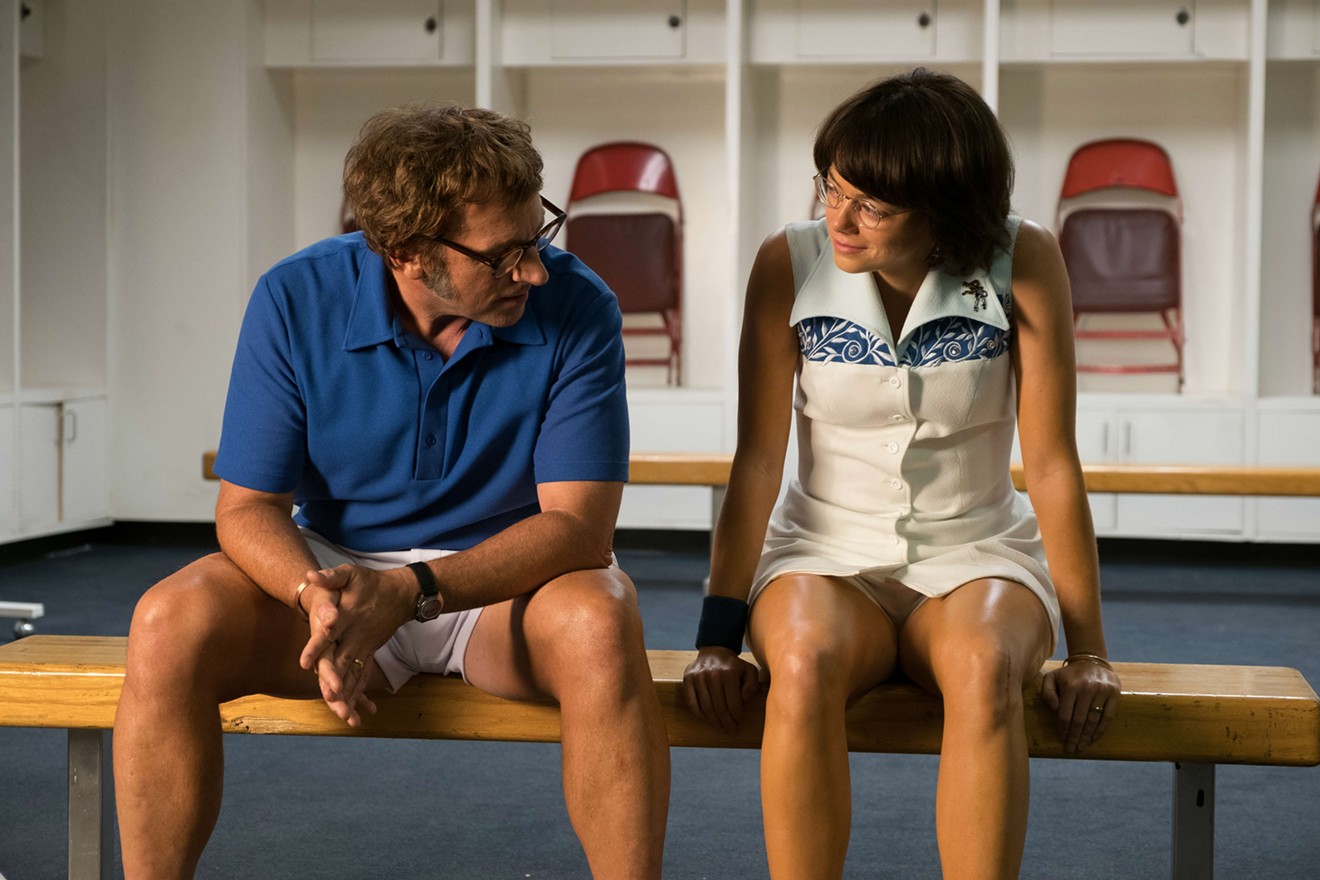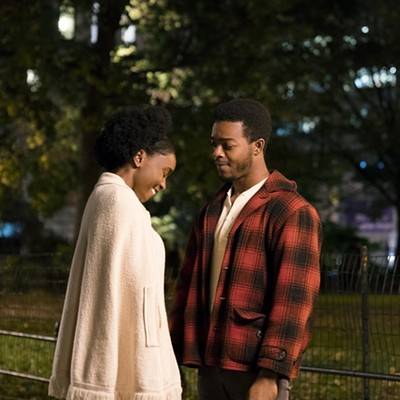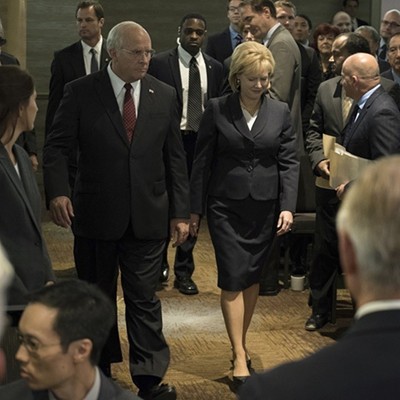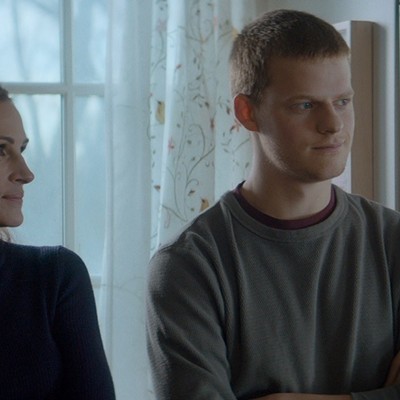In Battle of the Sexes, Jonathan Dayton and Valerie Faris’ film rehashing the most infamous tennis match in modern history, Billie Jean King (Emma Stone) must brawl with the coed United States Tennis Association for equal pay as she comes to terms with her attraction to women and what might be the dissolution of her marriage to tennis promoter Larry King (Austin Stowell). Everything seems to come to a head when aging star Bobby Riggs (Steve Carell) challenges King to a match to settle, once and for all, the question of whether women are equal to men — or just to make some cash, and help Billie prove a point.
This is a story that’s been begging for a Hollywood telling since 1973. Holly Hunter and Ron Silver once starred in an unusually good television adaptation (When Billie Beat Bobby) back in 2001, but that version, from director Jane Anderson, lacked the budget to capture the era. This version, however, boasts two recent Oscars veterans, the directing team behind Little Miss Sunshine, a script from Simon Beaufoy (127 Hours) and design from Judy Becker (Carol, American Hustle, Brokeback Mountain). Should be a grand slam, right?
Not quite. Stone and Carell fully embody their characters, with Stone playing a subdued version of the cocky King and Carell embracing the bizarre antics of Riggs, who had essentially turned his tennis career into an exhibition sideshow act, with costumes and cute animals and cheerleaders. In real life, these two — the feminist and the self-proclaimed male chauvinist pig — were friends; the last words Billie spoke to Bobby before his death were, “I love you.” Stone and Carell ace the warmth and competitive camaraderie of that relationship. When Billie and Bobby interact with everyone else in this story — specifically love interests — woo-boy does Battle of the Sexes whiff the serve.
It’s almost as though Beaufoy can’t help but turn this film into a cheesy romance packed with saccharine Hollywood dialogue. But did I expect something else from the writer of the ultimate damsel-in-distress fairy tale, Slumdog Millionaire? Difficult situations get magically solved by poetically vague lines (“Someday we’ll be free to love who we love.”), and characters never lose their tempers or feel extraordinarily bad, as they might in life; everyone here seems to know exactly what to say and when to say it.
That may float for an epic romance, but in a real-world story steeped in complex gender politics, it’s grating. And when the film attempts actual romance, after Billie meets hairdresser Marilyn Barnett (Andrea Riseborough), Beaufoy can’t work out what two women falling in love might say to one another. Dayton and Faris instead fill those scenes with furtive glances and collaged shots of hands touching hair. Marilyn is “free” and essentially a Manic Pixie Dream Lesbian, whose magical shears, when she trims hair, reveal a person’s latent queerness. I found myself sighing loudly and wishing Marilyn would just go away — not so Billie could focus on her husband, but so she could focus on the game and maybe find a lover who had something interesting to say. That the filmmakers wanted to include Billie’s silent struggle with loving one man publicly and one woman privately is commendable. But dear lord, give the lesbian a character, please.
Dayton and Faris fare better with the sports side of the film. Everything leads up to the big match, broadcast to millions from the Astrodome. Stone and Carell may not be natural tennis players, but they sell their skills well and adopt the physical mannerisms of their characters to a T. I was as thrilled watching the match scenes as I am when I’m watching the actual footage of the event, and that’s a difficult feat for any filmmaking team to accomplish.
One of the more interesting aspects of this film, however, lies not in what’s on the screen but in how people perceive it. Throughout, we hear men spout dumb “facts” about women’s anatomy, about their emotions, about their intelligence — it was, after all, 1973. But every time a sexist statement was said onscreen, men in my audience laughed. These were good-natured laughs. The laughers meant no harm. But these were also ignorant laughs — I didn’t hear one woman laugh with them. Why? Because these attitudes onscreen — like when Howard Cosell (in archival footage) says to an audience of millions that Billie could look pretty if she just let her hair grow out and took off her glasses — aren’t antiquated. It’s what women deal with on a daily basis. Hell, John McEnroe said in June that Serena Williams would be “like No. 700 in the world” on the men’s circuit. Billie Jean King may have won the battle, but we haven’t won the war — if we had, maybe a woman could have written this film about women’s empowerment.
Support Us
Houston's independent source of
local news and culture
account
- Welcome,
Insider - Login
- My Account
- My Newsletters
- Contribute
- Contact Us
- Sign out
Stone and Carell are Ace, but Battle of the Sexes Too Often Faults
April Wolfe September 21, 2017 3:00PM

In Battle of the Sexes, Emma Stone (right) plays a subdued version of the cocky Billie Jean King and Steve Carell embraces the bizarre antics of Bobby Riggs.
Melinda Sue Gordon/Twentieth Century Fox
[
{
"name": "Related Stories / Support Us Combo",
"component": "11591218",
"insertPoint": "4",
"requiredCountToDisplay": "4"
},{
"name": "Air - Billboard - Inline Content",
"component": "11591214",
"insertPoint": "2/3",
"requiredCountToDisplay": "7"
},{
"name": "R1 - Beta - Mobile Only",
"component": "12287027",
"insertPoint": "8",
"requiredCountToDisplay": "8"
},{
"name": "Air - MediumRectangle - Inline Content - Mobile Display Size 2",
"component": "11591215",
"insertPoint": "12",
"requiredCountToDisplay": "12"
},{
"name": "Air - MediumRectangle - Inline Content - Mobile Display Size 2",
"component": "11591215",
"insertPoint": "4th",
"startingPoint": "16",
"requiredCountToDisplay": "12"
}
,{
"name": "RevContent - In Article",
"component": "12527128",
"insertPoint": "3/5",
"requiredCountToDisplay": "5"
}
]
KEEP THE HOUSTON PRESS FREE...
Since we started the Houston Press, it has been defined as the free, independent voice of Houston, and we'd like to keep it that way. With local media under siege, it's more important than ever for us to rally support behind funding our local journalism. You can help by participating in our "I Support" program, allowing us to keep offering readers access to our incisive coverage of local news, food and culture with no paywalls.
Trending Film
- International Film Festival 2000
- It’s Sadly Kind of Perfect That New Season of GLOW Is Stolen by Marc Maron
- Bora! Bora! Bora!
-
Sponsored Content From: [%sponsoredBy%]
[%title%]

Don't Miss Out
SIGN UP for the latest
news, free stuff and more!
Become a member to support the independent voice of Houston
and help keep the future of the Houston Press FREE
Use of this website constitutes acceptance of our
terms of use,
our cookies policy, and our
privacy policy
The Houston Press may earn a portion of sales from products & services purchased through links on our site from our
affiliate partners.
©2024
Houston Press, LP. All rights reserved.




